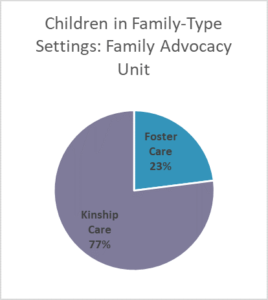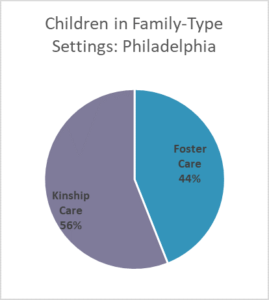For decades, the Family Advocacy Unit at Community Legal Services has provided holistic family defense for parents involved in child welfare cases, pairing attorneys with social workers and paralegals to provide wrap-around support to our clients. Recently, there has been a growing recognition that children do better when their parents are provided with intensive, tailored legal support. In 2017, the federal Children’s Bureau issued an Information Memorandum highlighting the benefits of investing in high-quality legal representation for parents, including increased family engagement, shortened foster care stays, and cost savings. In recognition of these benefits, last year the federal government agreed for the first time to partially reimburse the costs that counties and states pay for parent representation.
We have long believed that our model supports good outcomes for children, and data has shown the benefits of interdisciplinary parent representation. But we were curious about outcomes for our own clients, so in 2016, we started keeping data on outcomes for children whose parents were represented by our office in new dependency cases. While these results are preliminary, our early outcomes suggest that children whose parents have our representation are significantly more likely that other dependency-involved children in Philadelphia to stay at home or with family, and reunify with their family at a much faster rate if they must be separated. In this post, we share our outcomes on two key indicators in child welfare: kinship care and time to reunification.
Kinship
There is broad consensus in the child welfare community about the value of kinship care. While we work to keep children safely at home whenever possible, we know that if they must be separated, kids do best when they are placed with someone whom they know and love. Research shows that children who are placed in kinship foster care instead of non-relative foster care have more placement stability, improved behavioral health, and more positive feelings about their placements. Kinship care is often key to preserving a child’s cultural identity and connection to her community, which is particularly crucial in light of child welfare’s historic and continuing disproportionate impact on communities of color.
Our interdisciplinary teams work with parents to identify and mobilize their natural support network so that children are placed in homes that honor their need for family connection. We are fortunate to be practicing in Philadelphia, where our city has strongly prioritized kinship care, with impressive results. We found that while Philadelphia as a whole outperforms the rest of the state on kinship, children whose parents who have our advocacy are significantly more likely to experience kinship placements than other children in Philadelphia[1][2]:


Time to Reunification
While there are many controversies that animate child welfare, much of child welfare policy over the past several decades has been driven by a near-universal agreement that prolonged foster care stays are bad for children. Research has shown that foster care is a traumatic intervention that is often associated with negative outcomes for children, and as a result both law and policy prioritize safely reunifying families as quickly as possible.
While most families can successfully reunify, we often see parents encounter obstacles to accessing the services and supports they need to stabilize. Our interdisciplinary teams provide intensive advocacy to ensure that parents are connected to the tailored supports they need, and also work to address the collateral economic and legal barriers that can lead to lengthy foster care stays.
Our results suggest that this support significantly reduces the time that children spend in foster care:
New York City Study
Our early results suggest similar outcomes to those established by a landmark, comprehensive study of the value of interdisciplinary parent representation that was released earlier this year. This study compared outcomes for children in New York City whose parents had traditional representation by solo practitioners with outcomes for children whose parents were represented by interdisciplinary law offices that include lawyers, social workers, and peer advocates.
The research found incredible benefits of interdisciplinary parent representation, including:
- Children on average spent 4 fewer months in foster care through early reunification outcomes;
- Children were just as safe going home early—there was no evidence of increased subsequent child maltreatment;
- Significantly higher rates of kin placement; and
- Annual cost savings of at least $40 million.
Reviewing the results of the research, Martin Guggenheim and Susan Jacobs concluded: “It’s now time to recognize parents’ lawyers and other members of the multidisciplinary legal team as allies to the system, committed to the identical values that drive it: Keep no child from his or her parents, for even one night, except when necessary to protect the child from a risk of serious harm.”
While our own data cannot match the scope and depth of the data collected by New York City, we believe that our early indicators support a growing recognition that outcomes for children are directly correlated to the support that we offer their parents. The attorneys, social workers, and paralegals in the Family Advocacy Unit operate on the understanding that helping a parent is one of the best ways that you can help a child, and we are excited to see our data reflect that value.
[1] Source: Philadelphia DHS 2019 Q3 Report: https://www.phila.gov/media/20190812144213/Quarterly-Indicators-Report-FY2019Q3.pdf
[2] “Family-Type Settings” includes children in DHS custody who reside in a family home, either in kinship or foster care. The term excludes children who are placed in residential programs like group homes.
[3] Source: Pennsylvania Partnerships for Children, State of Child Welfare 2019: https://www.papartnerships.org/wp-content/uploads/2019/04/2019-State-of-Child-Welfare-Philadelphia-County.pdf



 [3]
[3]


